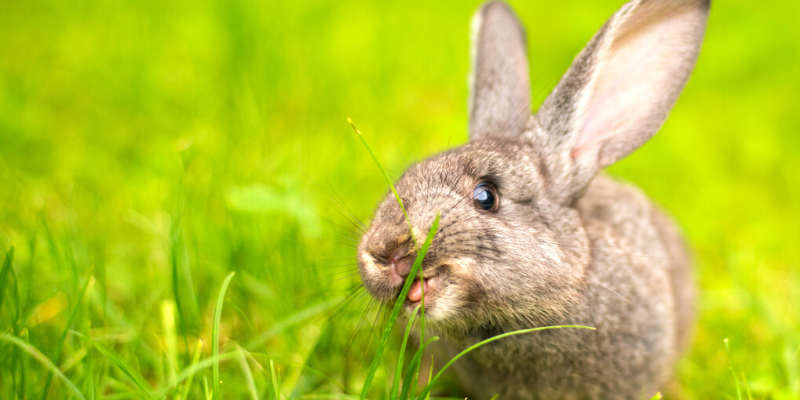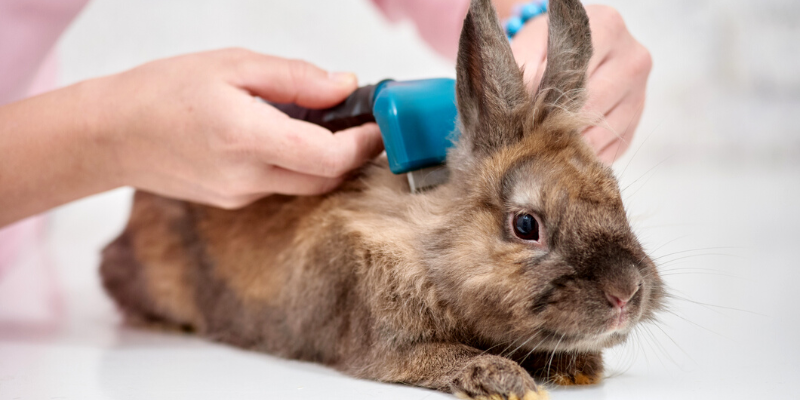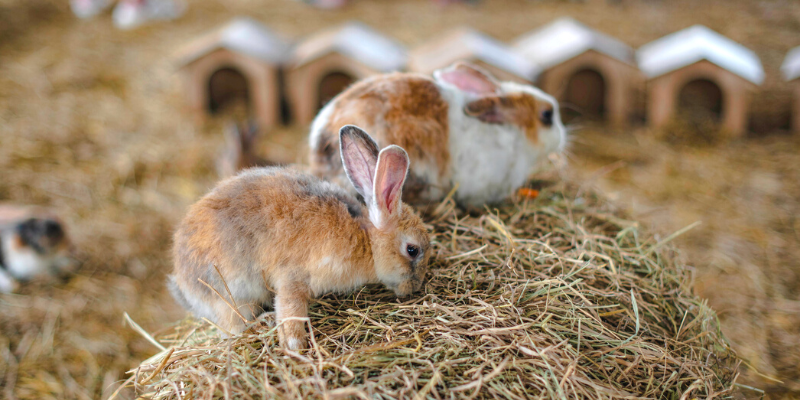Rabbits are inquisitive, affectionate, and active animals who love to play and forage. These fluffy friends come in all shapes and sizes and all with their personalities, making an exciting and enjoyable experience for both of you. But we need to make sure that their needs are put first, and we provide all the necessary elements of a rabbit’s lifestyle to keep them healthy and happy.
What should we be feeding our rabbits
Rabbits need a balanced diet to stay healthy and active throughout the day and night. Providing your furry friends with a diet that mimics what they would eat in the wild is important for digestive health. Therefore, a widely grass-based diet should be given (around 85% of their total diet) which is as much hay or grass as you can provide or a heap as big as them, each day. The remainder of the diet should be smaller portions, with greens making up the majority and an egg cup-sized serving of concentrate feed per 1kg of body weight.
Feeding your rabbit can be less expensive than you may think. The majority of this can be found in your garden, so it depends on what you want to give your rabbits. Broccoli, parsley, and kale are great types of greens from the supermarket, whereas dandelions from your garden can be equally as nutritious and delicious. But keep it varied and provide a mixture of leafy greens, so your rabbit doesn’t get bored of the same food.


A few things to remember:
- Fruits contain high levels of natural sugar so should be used as a treat. One small slice of an apple once or twice a week is sufficient for your little friend.
- Don’t feed lawn clippings due to the quick fermentation of the grass, which can be extremely harmful to rabbits if consumed.
- If you are picking greens from your garden, avoid areas that have been sprayed with pesticides and always make sure you wash those greens.
Water is just as vital as a good diet for your rabbit. Plentiful fresh water supplies should be available at all times of the day, particularly for those consuming more hay than grass. The need for water is essential, as it allows everything to keep moving in the gut and maintains all the vital organs for your rabbit to function.
If you are worried about any problems, a veterinarian will always be happy to advise or take a look at your bunny to ensure they are healthy and well.
Why do we need to groom a rabbit
Rabbits are known for spending time grooming themselves, but they tend to swallow lots of the fur during the process, causing the digestive system to slow down. Ensuring a good grooming routine is in place can significantly help your rabbits, particularly when they are moulting. You should aim to groom them daily using comfortable grooming equipment to carefully brush out their fur and delicate skin.
Grooming your rabbit regularly can enable you the time to give them a thorough check-over and to spot any signs of problems that could affect their health. You do not need to go wild with hair driers and curling wands to groom your rabbit, just a few basic tools to keep them looking healthy and happy.
- Rubber pimple mitt
- Comb
- Soft brush
- Nail clippers


Housing your rabbit
Ensuring your rabbit has the correct housing is one of the most important parts of owning a rabbit. They need areas to run, jump and stretch, but also need a cosy area to sleep with a straw or shaving based bedding. It is recommended that the minimum enclosure area for a pair of rabbits is 3m x 2m x 1m high. Many welfare organisations have agreed that for a happy rabbit, a hutch is not enough, and many problems can arise from using a small hutch such as isolation, boredom, and minimal room for exercise.
Providing a large area indoors or outdoors for your rabbit will allow them to complete their ‘normal’ behaviours; these houses can include:
Outdoor housing- Garden shed or large hutch joined to an outdoor run.
Indoor housing- An accommodated room to themselves or a sectioned off area.
Providing an enriched environment
Rabbits are inquisitive animals who like to live an active life as they would in the wild. Large amounts of their day will consist of digging, running, jumping, and stretching, which they naturally do when foraging. Ensuring they have the right diet and environment to live in will make sure they can be happy, but providing suitable types of enrichment can increase their natural behaviours.
- Tunnels- Providing your rabbits with tunnels or a cardboard box with holes at both ends can be a fantastic addition to their environment. The tunnels and hideaways can be filled with hay which will encourage burrowing and allow your rabbits to be more active.
- Toys- Placing lots of toys in their enclosure can ensure your rabbits are entertained all day. There are lots of toys you can get hold of, but some of the most favoured are willow and treat balls which can be safely tossed around the enclosure.
- Digging pits- Trays filled with earth can create a digging pit for rabbits not out on the grass. These can be left aside to shoot fresh grass and then placed in the enclosure or used straight away for your rabbits to dig through.
- Foraging- Rabbits love to return to their roots and forage for food like they would in the wild. Hiding treats or concentrate feed in tunnels or under their hay can encourage foraging behaviours.


Your bunny checklist, from their head to their toes
When you are out with your bunny or grooming them, you can have a good check over for any problems you may encounter.
- Eyes – Check that their eyes are bright and clean and that they are not running.
- Nose – Their noses should be clean and dry. Regular sneezing could lead to a runny nose.
- Fur and Skin – When checking your rabbit’s fur, you should ensure it is clean and shiny, don’t panic if they are moulting (this is normal). Remember to be gentle when grooming as their skin is extremely sensitive.
- Ears – See if their fluffy ears are clean and dry and are not full of visible wax.
- Teeth – Your rabbit’s teeth should be lined up correctly to allow comfort when eating, and to ensure they do not grow too long.
- Tail – Checking their tail and bottom is important to ensure they are dry and clean, and no problems such as flystrike can arise.
- Hocks and Feet – Making sure your rabbit’s nails are trimmed and their hocks are free from sores is especially important for comfort.
For more information on caring for your rabbits, visit the Rabbit Welfare Association to get all the tips you need to maintain a healthy, happy rabbit. If you are ever worried about your rabbit's health or any problems that have appeared, always seek advice from a veterinarian.












